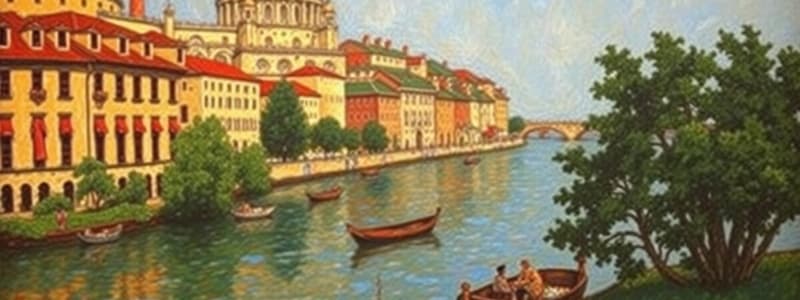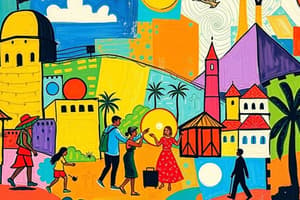Podcast
Questions and Answers
How might travel exacerbate environmental challenges in ecologically sensitive areas?
How might travel exacerbate environmental challenges in ecologically sensitive areas?
- By prioritizing tourist satisfaction over environmental protection, resulting in pollution and deforestation. (correct)
- By promoting environmental conservation through increased awareness.
- By encouraging sustainable water management practices, thereby preventing water shortages.
- By leading to reduced pollution levels due to eco-tourism initiatives.
What is an example of how a tour guide might adopt an 'unusual role' to enhance a traveler's experience?
What is an example of how a tour guide might adopt an 'unusual role' to enhance a traveler's experience?
- Facilitating transactions between tourists and local artisans.
- Focusing solely on reciting historical facts and figures without personal anecdotes.
- Strictly adhering to a pre-planned itinerary to maintain efficiency.
- Becoming deeply involved as a cultural interpreter or community advocate, thereby fostering a truly immersive travel experience. (correct)
In what way can travel contribute to improved infrastructure within a destination?
In what way can travel contribute to improved infrastructure within a destination?
- By decreasing the demand for local resources, freeing them up for infrastructure projects.
- By generating revenue that can be reinvested in local infrastructure and services like roads and healthcare. (correct)
- By reducing the local population's reliance on public services like transportation.
- By diverting funds from environmental conservation efforts to infrastructure development.
How does community engagement by a tour guide contribute to responsible tourism?
How does community engagement by a tour guide contribute to responsible tourism?
Considering the potential for water shortages due to travel, what strategy could best mitigate this issue in drier regions?
Considering the potential for water shortages due to travel, what strategy could best mitigate this issue in drier regions?
A tour operator aims to create a highly immersive experience that resonates deeply with visitors on an emotional and intellectual level. Which approach would MOST comprehensively contribute to this goal, considering the multifaceted role of a tour guide?
A tour operator aims to create a highly immersive experience that resonates deeply with visitors on an emotional and intellectual level. Which approach would MOST comprehensively contribute to this goal, considering the multifaceted role of a tour guide?
A historical tour focuses on sensitive cultural events. Which training approach would MOST effectively prepare tour guides to handle these topics responsibly and respectfully?
A historical tour focuses on sensitive cultural events. Which training approach would MOST effectively prepare tour guides to handle these topics responsibly and respectfully?
A tour company wants to enhance visitor satisfaction and ensure repeat business. Which strategy would BEST achieve this goal through tour guide education?
A tour company wants to enhance visitor satisfaction and ensure repeat business. Which strategy would BEST achieve this goal through tour guide education?
A tour guide encounters a visitor who expresses skepticism about the accuracy of a historical narrative presented during the tour. What response demonstrates the HIGHEST level of professionalism and commitment to factual accuracy?
A tour guide encounters a visitor who expresses skepticism about the accuracy of a historical narrative presented during the tour. What response demonstrates the HIGHEST level of professionalism and commitment to factual accuracy?
A tour company is expanding its operations to a region with diverse cultural traditions. How can the company BEST ensure its tour guides deliver culturally sensitive and respectful experiences?
A tour company is expanding its operations to a region with diverse cultural traditions. How can the company BEST ensure its tour guides deliver culturally sensitive and respectful experiences?
What strategy most effectively enables tour guides to advocate for issues they are passionate about while leading tours?
What strategy most effectively enables tour guides to advocate for issues they are passionate about while leading tours?
When designing a 'working towards change' tour in a rural area, what is the most effective way to balance educating visitors about the challenges faced by small farmers with promoting agritourism?
When designing a 'working towards change' tour in a rural area, what is the most effective way to balance educating visitors about the challenges faced by small farmers with promoting agritourism?
How can tour guides most ethically balance the need to educate tourists about the threats to endangered species with the guidelines for responsible wildlife viewing?
How can tour guides most ethically balance the need to educate tourists about the threats to endangered species with the guidelines for responsible wildlife viewing?
In a historical city tour designed with a 'working towards change' approach, how can a tour guide effectively address the challenges faced by marginalized communities without perpetuating stereotypes?
In a historical city tour designed with a 'working towards change' approach, how can a tour guide effectively address the challenges faced by marginalized communities without perpetuating stereotypes?
A tour company wants to adopt ‘working towards change’ principles. What action would be most effective at the organizational level?
A tour company wants to adopt ‘working towards change’ principles. What action would be most effective at the organizational level?
Which scenario exemplifies a guide adapting their approach based on constructivist learning theory?
Which scenario exemplifies a guide adapting their approach based on constructivist learning theory?
A historical tour guide notices that the group is particularly interested in the social dynamics of the period. Which of the following actions best demonstrates an adaptive approach to guiding?
A historical tour guide notices that the group is particularly interested in the social dynamics of the period. Which of the following actions best demonstrates an adaptive approach to guiding?
A tour guide is leading a group with varying levels of physical fitness. Applying the concept of scaffolding, what should the guide do?
A tour guide is leading a group with varying levels of physical fitness. Applying the concept of scaffolding, what should the guide do?
When applying behaviorism in guiding, what is the most effective way to encourage desired behaviors?
When applying behaviorism in guiding, what is the most effective way to encourage desired behaviors?
Which of the following scenarios best illustrates a tour guide effectively using social learning theory to enhance the learning experience?
Which of the following scenarios best illustrates a tour guide effectively using social learning theory to enhance the learning experience?
Flashcards
Economic impacts of travel
Economic impacts of travel
Travel can boost economic activity, create jobs, and reduce poverty.
Social impacts of travel
Social impacts of travel
Travel promotes cultural exchange and community development.
Environmental impacts of travel
Environmental impacts of travel
Travel can lead to pollution and water shortages, especially in sensitive areas.
Guide's unusual role
Guide's unusual role
Signup and view all the flashcards
Personalized storytelling
Personalized storytelling
Signup and view all the flashcards
Adaptive Approach
Adaptive Approach
Signup and view all the flashcards
Scaffolding
Scaffolding
Signup and view all the flashcards
Behaviorism
Behaviorism
Signup and view all the flashcards
Cognitivism
Cognitivism
Signup and view all the flashcards
Social Learning Theory
Social Learning Theory
Signup and view all the flashcards
Community Engagement
Community Engagement
Signup and view all the flashcards
Sustainable Practices
Sustainable Practices
Signup and view all the flashcards
Cultural Sensitivity
Cultural Sensitivity
Signup and view all the flashcards
Empowering Visitors
Empowering Visitors
Signup and view all the flashcards
Positive Community Impact
Positive Community Impact
Signup and view all the flashcards
Educating the Tour Guide
Educating the Tour Guide
Signup and view all the flashcards
Deep Local Knowledge
Deep Local Knowledge
Signup and view all the flashcards
Storytelling Skills
Storytelling Skills
Signup and view all the flashcards
Guest Engagement
Guest Engagement
Signup and view all the flashcards
Study Notes
ETOUR Chapter 4
- Travel has significant economic, social, and environmental impacts on destinations.
Economic Impacts
- Economic growth: Increased economic activity in a destination can lead to job creation, higher revenue, and a reduction in poverty.
- Infrastructure improvements: Travel often leads to improved infrastructure, including roads, healthcare, and education.
Social Impacts
- Cultural exchange: Traveling fosters global awareness and cross-cultural understanding.
- Community development: Travel can help alleviate social inequalities and food sovereignty issues.
- New experiences: Travel helps people connect more deeply with destinations.
Environmental Impacts
- Pollution and deforestation: Tourism can negatively impact the environment, particularly in areas with already strained resources
- Water shortages: Travel may exacerbate water scarcity in dry regions.
- Positive and negative local impacts: Travel can have both positive and negative health outcomes for local communities.
The Guide's Unusual Role
- A guide's responsibilities can extend beyond just providing information and leading a group.
- They can act as a cultural interpreter, advocate for local communities, teach conservation, and even translate for diverse situations.
- Guides in unique situations might provide a better, more immersive experience.
Key Points about a Guide's Unusual Role
- Deep local knowledge: Sharing intimate details of local traditions and hidden gems.
- Community engagement: Actively connecting tourists with local communities.
- Specialized expertise: Focusing on specific aspects like wildlife, history, or cuisine.
- Personalized storytelling: Creating narratives specific to each guest and the destination.
- Adaptive approach: Adjusting the tour based on the group's needs and interests.
Applying Learning Theories to Guiding
- Understanding the learner: Identify learner needs, learning style and motivation.
- Setting clear goals: Establish clear, measurable objectives for learning.
- Scaffolding: Provide support progressively decreasing the assistance as the visitor becomes more confident.
- Behaviorism: Positive reinforcement (praise, rewards) to encourage repetition of desired behavior.
- Feedback loop: Provide immediate feedback to help improve performance.
- Cognitivism: Chunking information into smaller parts for easier absorption. Visual aids (charts, diagrams).
- Constructivism: Encourage active learning, connect new information to existing knowledge.
- Social learning theory: Encouraging collaboration, demonstrating desired behaviours.
Educating the Tour Guide
- Knowledge and information: Provide thorough training on local history, culture, and relevant details about the destination.
- Accurate and engaging delivery: Equip guides to deliver information clearly, accurately, and engagingly.
- Cultural sensitivity: Training to be respectful of local customs, beliefs, and practices.
Key Aspects of Educating a Tour Guide
- Deep local knowledge: A profound understanding of the area's history, geography, and culture.
- Factual accuracy: Ensure accurate and up-to-date information regarding historical events, people, or places.
- Cultural sensitivity: Training to be respectful of traditions.
- Storytelling skills: Develop compelling narratives using anecdotes.
- Guest engagement: Involve visitors actively with the tour.
- Logistics and safety: Providing travel knowledge, considering safety and potential hazards.
- Methods of educating a tour guide: Guided courses, on-site familiarization, reading materials, expert consultation and mentorship programs.
Why is Educating the Guide Important?
- Enhances visitor experience: Allows for better understanding of the destination.
- Promotes cultural understanding and appreciation.
- Improves destination image.
Licensing and Certification of Tour Guides
- Completion of training courses
- Passing an exam
- Acquiring certification from the relevant tourism authorities
- Additional documents like valid health certificates and police clearances
Common Documents for Tour Guide Licensing
- Completed application form
- Proof of tour guide training
- Examination passing certificate
- Valid government-issued ID
- Recent passport-sized photo
- Health certificate
- Police clearance
Specialization Options for Tour Guides
- Cultural heritage guide
- Nature guide
- Adventure guide
- Food and wine guide
Working Towards Change Tour Guides
- Focus on local issues: Actively researching local issues for the tourists.
- Community engagement: Partnering with local communities to showcase their efforts to tourists
- Sustainable practices: Highlighting responsible transportation plans, and minimizing environmental impact.
- Cultural sensitivity: Respect for local customs, traditions and beliefs.
- Empowering visitors: Supporting local businesses.
Classification of Tours by Movement
- Domestic: Locals visiting within their home country.
- Inbound: Foreigners visiting a country.
- Outbound: Locals visiting a foreign country.
Tour Guide Roles
- Guide: Assists tourists and provides information and direction
- Coordinator: Coordinates with tours and suppliers
- Escort: Assists tourists with movement between places
- Travel Agent: Operates/works for the tour agency. Handles many aspects of the tour
Characteristics of a Tour Guide
- Accepting the authority
- Attentive and focused
- Candid
- Caring
- Cheerful
- Conclusive
- Confident
- Considerate
- Dedicated
- Dependable
- Dynamic
- Friendly
- Motivated
- Polite
- Prompt
Important Skills for a Tour Guide
- Strong communication skills; In-depth local knowledge, Organizational skills, Customer service skills.
Further Study Points
- National guide curriculum (Philippines). Accreditation details.
Studying That Suits You
Use AI to generate personalized quizzes and flashcards to suit your learning preferences.




